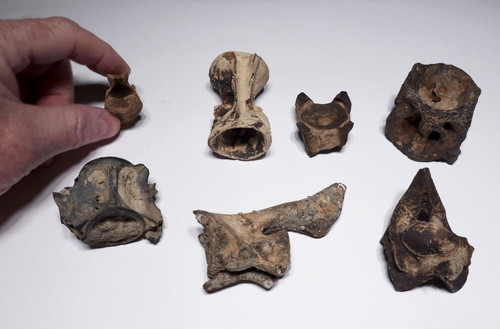Product Description
This is one of only two original associated Otodus obliquus shark fossils we have ever made available for sale. The framed matrix encases the remains of an extinct shark with its vertebrae AS FOUND, in their original host matrix. The block of matrix containing the vertebrae was removed from the original field collection jacket, and that block was set into the frame with the addition of the remaining sand from the same jacket, found with the fossil. The smaller teeth were found with the vertebrae and the larger teeth have been added but are from the same fossil deposit. This is a rare fossil spinal column from this extinct shark, in their naturally-associated positions as the shark died and was buried. The presence of ASSOCIATED (not artificially assembled together as most Moroccan fossils are) vertebrae like this, indicates the shark died and was buried in this form.
Since a shark has no bone and only cartilage, fossilized vertebrae are extraordinarily rare! Shark fossil remains such as this are VERY, VERY RARE and always are a treat when they are available as they display the actual remains of the death of an extinct prehistoric shark rather than just the shed teeth when the shark was alive. There are many teeth that a shark sheds in life - some say 10,000 per shark. But when the shark dies, there are only the teeth in its jaws and a finite number of vertebra. Considering this and that very few animals fossilize out of the millions that died, one can see how rare this specimen is. Furthermore, the display of a string of articulated vertebrae shows how the shark was buried and fossilized.
The Otodus obliquus shark (Mackeral shark) is thought to be at the heart of the White shark family tree and its fossils are found in sandstone matrix in the phosphate mines in Khouribga, Morocco. The Mackeral Shark was king of the Paleocene seas 60 million years ago and is considered a prehistoric ancestor of the modern Great White Shark.
 US DOLLAR
US DOLLAR
 EURO
EURO
 AUSTRALIAN DOLLAR
AUSTRALIAN DOLLAR
 CANADIAN DOLLAR
CANADIAN DOLLAR
 POUND STERLING
POUND STERLING


















